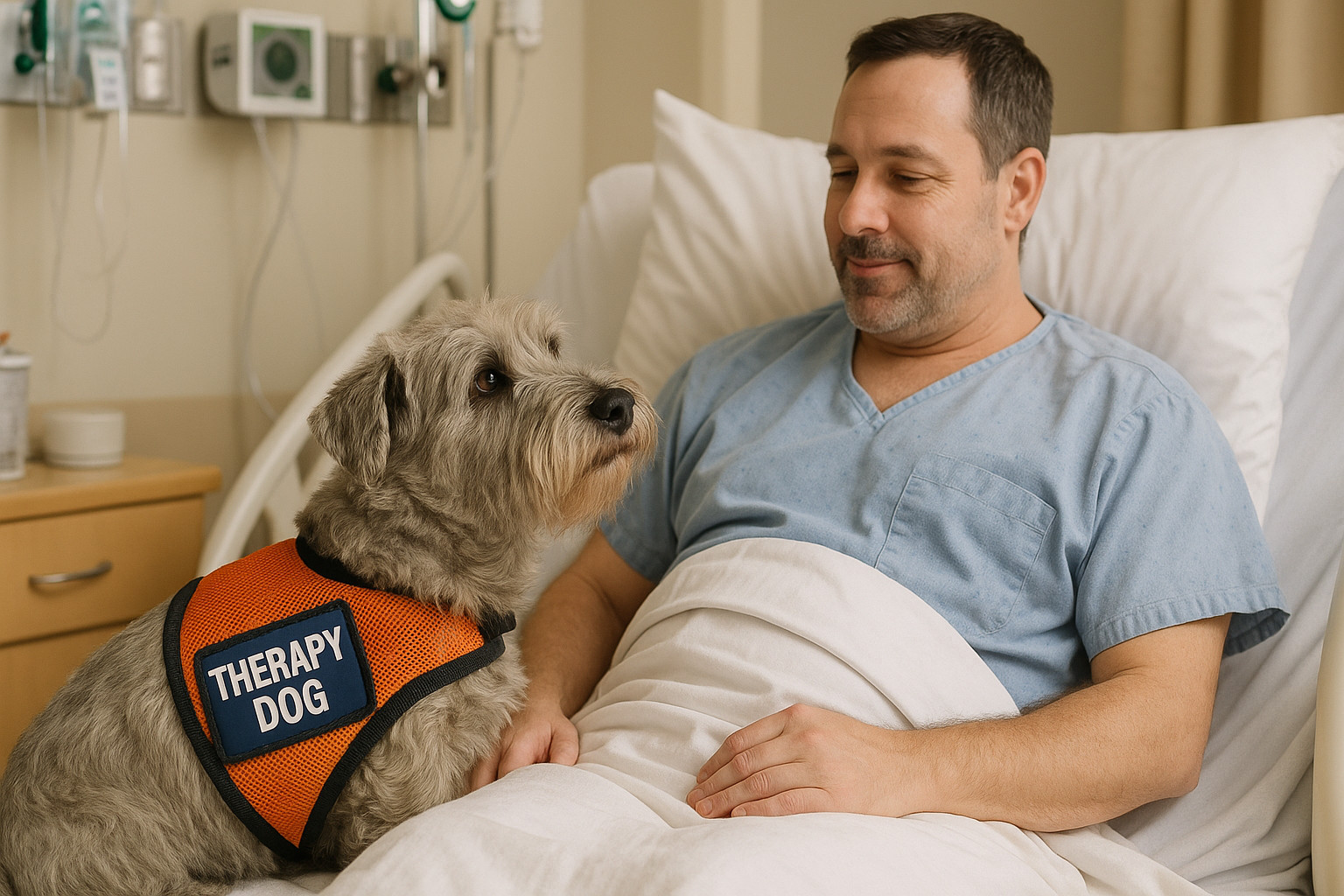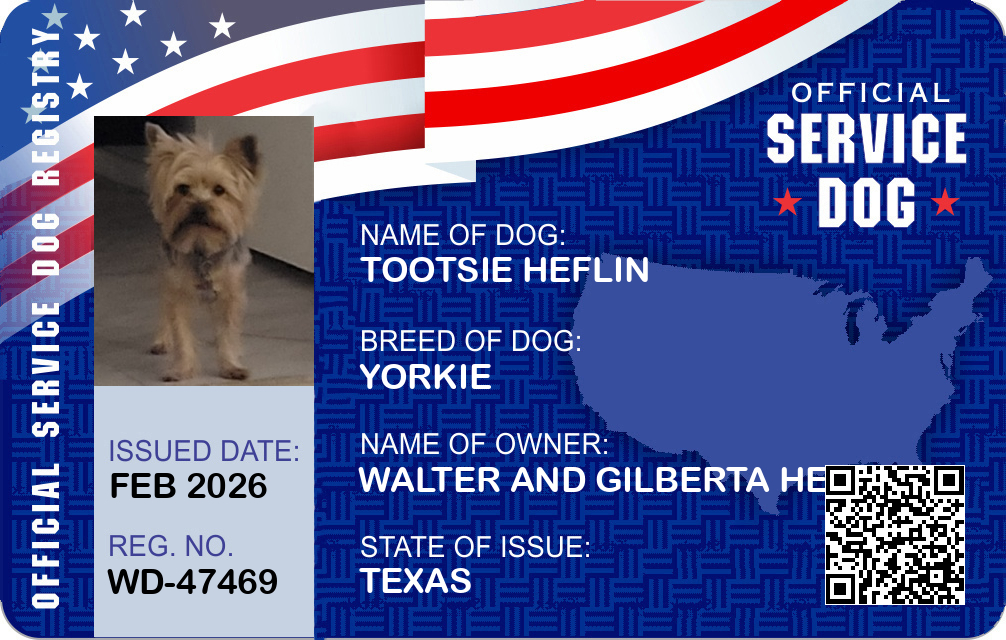Glen of Imaal Terrier as a Therapy Dog
Get Your Documents

Glen of Imaal Terrier as a Therapy Dog Overview
The Glen of Imaal Terrier, a distinctive breed from Ireland’s picturesque Glen of Imaal, boasts a robust temperament. This makes it an exceptional candidate for therapy work. Although historically bred for hunting and labor, this breed possesses qualities well-suited for therapy roles. They provide comfort and companionship in both clinical and social settings.
Understanding the Therapy Dog Role
Therapy dogs play a crucial role in enhancing psychological and physical well-being by offering comfort, companionship, and emotional support. They support individuals across diverse settings. Unlike service dogs, their primary role is not to perform tasks for a single individual. Instead, they provide universal emotional support. A therapy dog should exhibit patience, calmness, adaptability, and empathy — traits where the Glen of Imaal Terrier often excels.
Physical Appearance and Energy Level
The Glen of Imaal Terrier is medium-sized with an unmistakable sturdy build. This feature can be reassuring and comforting to those they visit. Usually weighing between 32-40 pounds, they strike an ideal balance for therapy work: not too small to be fragile and not too large to be overwhelming. Their moderate energy level enables them to engage actively when necessary. Yet, they remain calm and relaxed, creating a soothing presence.
Their unique coat, which is tough to the touch but soft underneath, can be therapeutic to stroke, providing tactile comfort. In environments where physical interaction is important, their approachable and huggable nature makes them an excellent partner.
Personality and Emotional Intelligence
Glen of Imaal Terriers possess high levels of emotional intelligence, evidenced by their ability to sense and respond to human emotions effectively. Known for their spunky yet gentle demeanor, they display empathy and patience. These traits are critical for interacting with individuals who may be experiencing stress or discomfort.
Here are some personality highlights that influence their success as therapy dogs:
- Calm Demeanor: They exhibit a generally calm and composed temperament, vital for stressful environments such as hospitals or care facilities.
- Affectionate Nature: Glens are naturally affectionate, loving to form bonds with humans and always ready to provide comfort.
- Adaptability: They adapt well to varied environments. They showcase resilience against loud noises or sudden changes, which can often distress other breeds.
Environments Where Glen of Imaal Terrier Excels
The breed is well-suited to quiet, controlled environments where their natural calmness shines. For instance, they are excellent in settings such as assisted living facilities. Additionally, they do well in rehabilitation centers and schools. Their balanced energy level allows them to engage or rest as required.
Common Therapy Settings
Glen of Imaal Terriers thrive in these settings:
- Hospitals: Their calm presence can ease patients’ anxiety, aiding emotional healing.
- Nursing Homes: Their gentle nature and small stature make them approachable and comforting to elderly residents.
- Schools: Good with children and adolescents, they can become effective reading partners and support during therapy sessions. This helps promote focus and alleviate stress.
Interactions with Different Populations
Their size and temperament make Glens suitable for various groups, including:
- Children: Known for patience and a playful streak, they can engage and comfort children effectively. They often serve as an empathetic and non-judgmental friend.
- Elderly Individuals: Their gentle and non-threatening disposition makes them ideal companions for seniors, providing emotional support and facilitating social interaction.
- Patients in Recovery: Glens can adapt to the needs of individuals in physical or mental recovery. They serve as steadfast companions during challenging treatments.
Health and Wellness Factors
Understanding the health profile of a therapy dog is crucial for ensuring they can provide effective and consistent support. Glen of Imaal Terriers generally enjoy robust health, but like all breeds, they can be prone to certain genetic conditions.
Lifespan and Common Health Issues
With a lifespan of about 12-15 years, Glen of Imaal Terriers offer the potential for a long-standing therapy partnership. Regular veterinary check-ups are important to monitor and manage health conditions such as hip dysplasia, Progressive Retinal Atrophy (PRA), and potential allergies. These issues, if undiagnosed, could limit the dog’s ability to perform therapy tasks effectively.
Maintenance and Care Needs
Proper grooming and care are vital in maintaining a Glen’s ideal therapy condition. Their coat requires regular brushing to prevent mats that could cause discomfort. This discomfort could affect both the dog and the individuals they assist. Regular bathing and nail trimming are also essential. These components of their upkeep ensure they are presentable and pleasant to those they visit.
Training and Certification Readiness
Glen of Imaal Terriers are intelligent and motivated learners. They demonstrate readiness for therapy dog certification through structured training programs. These programs focus on obedience, socialization, and adaptation to diverse environments. Early socialization is crucial to their development as therapy animals. It helps them acclimatize to various social stimuli.
Learning Style and Responsiveness
Glens are responsive to positive reinforcement and exhibit a keen desire to please their handlers. Their moderate intelligence facilitates learning of therapy-specific tasks and commands, ensuring they can fulfill their role effectively.
Handling Social and Emotional Stimuli
Given their empathetic nature, Glen of Imaal Terriers handle a wide range of emotional cues well. They tend to remain unflustered by emotional highs and lows. This steady presence is comforting to individuals dealing with emotional stress.
Strengths, Limitations, and Ideal Roles for Glen of Imaal Terrier
While the Glen of Imaal Terrier shines in many areas, understanding their strengths and limitations is vital. This ensures they are placed in the right therapy roles.
Strengths:
- High Emotional Intelligence: They connect well with people emotionally, understanding and responding to their needs.
- Adaptability: Adjust quickly to new and changing environments, which is essential for varied therapy settings.
- Affectionate Nature: Offers unconditional love, creating emotional bonds that can enhance therapy results.
Limitations:
- Possible Health Issues: Without proper health checks, underlying issues could limit their activity and engagement.
- Indoor Space Needs: While adaptable, they require sufficient downtime and space. This need to retreat and recharge should be considered when planning visits.
Final Thoughts
In conclusion, the Glen of Imaal Terrier can be a tremendous asset as a therapy dog. They bring a unique blend of intelligence, calmness, and empathy to the table. Their affectionate nature and adaptability make them well-suited to a range of therapy environments. This is particularly true for those demanding a calm and comforting presence. By understanding their training needs and providing appropriate health care and grooming, these terriers can fulfill their potential as truly impactful therapy partners.
Key Takeaways for the Glen of Imaal Terrier as a Therapy Dog
- Best suited for: Controlled environments like hospitals, schools, and rehabilitation centers.
- Not ideal for: Highly active settings without room for downtime.
- Temperament highlights: Calm, affectionate, emotionally intelligent, adaptable.
- Care and health notes: Regular grooming and routine health checks are necessary.
- Therapy environments where they shine: Hospitals, nursing homes, schools.
Get Your Documents
Example State Cards













